
Holocentridae is a family of ray-finned fish, the only family of the order Holocentriformes. The members of the subfamily Holocentrinae are typically known as squirrelfish, while the members of Myripristinae typically are known as soldierfish. In Hawaii, they are known by the Japanese name mempachi/menpachi (メンパチ) or the Hawaiian ʻūʻū.

Chromis is a genus of fish in the family Pomacentridae. While the term damselfish describes a group of marine fish including more than one genus, most damselfish are in the genus Chromis. These fish are popular aquarium pets due to their small size, tolerance for poor water quality, and bright colors, though their lifespans tend to be shorter than other fish.

Sargocentron is a genus of squirrelfish found in tropical parts of the Indian, Pacific and Atlantic Oceans, with the greatest species diversity near reefs in the Indo-Pacific. Being largely or entirely nocturnal, they have relatively large eyes. Red and silvery colours dominate. The preopercle spines are venomous and can give painful wounds. Most have a maximum length of 15–25 cm (6–10 in), but S. iota barely reaches 8 cm (3 in), and S. spiniferum can reach more than 50 cm (20 in).

Myripristis is a genus of soldierfishes.
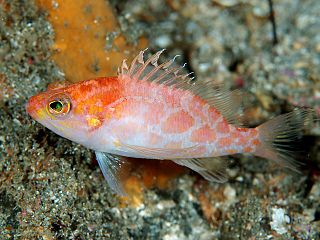
Plectranthias is a genus of ray-finned fish in the subfamily Anthiinae, part of the family Serranidae, the groupers and sea basses. They are found in the Atlantic, Indian and Pacific Ocean.

Enneapterygius is a genus of fish in the family Tripterygiidae found in the Indian and Pacific Ocean.
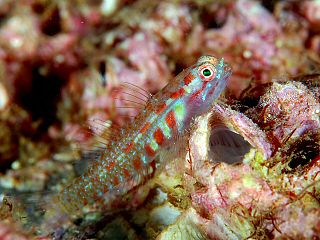
Eviota is a genus of fish in the family Gobiidae, commonly as dwarfgobies found in the Indo-Pacific region, where it is distributed from Japan to Australia and from Africa to Pitcairn Island. Species are mainly associated with coral reefs. Many of these fish are short-lived, with life cycles as brief as 3.5 weeks in the tropics. Some species are hermaphrodites and some representatives live symbiotically among the tentacles of the mushroom coral.
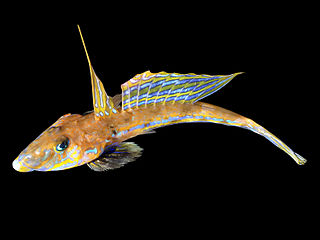
Callionymus is a genus of dragonets found mostly in the Indian and Pacific oceans with a few species occurring in the Atlantic Ocean.

Halichoeres, commonly called wrasses, are a genus of fish in the family Labridae found in the Atlantic, Indian and Pacific Oceans.

Myripristis vittata is a soldierfish from the Indo-Pacific.

Pterygotrigla is a genus of genus of marine ray-finned fishes belonging to the family Triglidae, the gurnards and sea robins, one of two genera belonging to the subfamily Pterygotriglinae. These gurnards are found in the Indian and Pacific oceans.
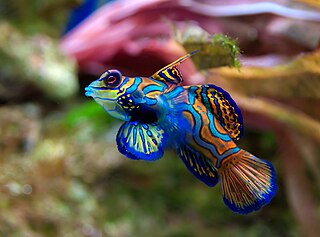
Synchiropus is a genus of fish in the family Callionymidae found mainly in the tropical waters of the Indo-Pacific region.

The straighthead soldierfish is a soldierfish species belonging to the family Holocentridae.
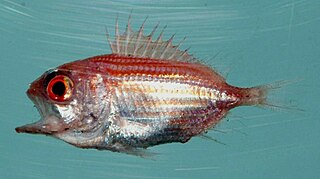
The bigeye soldierfish is a soldierfish species belonging to the family Holocentridae.

Paracirrhites is a genus of marine ray-finned fish, hawkfishes belonging to the family Cirrhitidae. These fishes are found on tropical reefs of the Indian Ocean and Pacific Ocean.

Parapercis is a genus of sandperches belonging to the fish family Pinguipedidae.

Grammatonotus is a genus of fish in the family Callanthiidae native to the Indian and Pacific Ocean. These fish are ovoid to elongated in shape, with short, rounded snouts. The anterior nostril is tubular. They have large teeth with one to two canine teeth on each side. The scales are large.

Hologymnosus is a genus of wrasses native to the Indian Ocean and the western Pacific Ocean.

Myripristis violacea is a species of fish in the family Holocentridae found in the Indo-Pacific Ocean

Ostichthys acanthorhinus, the spinesnout soldierfish, is a species of soldierfish belonging to the family Holocentridae.




















